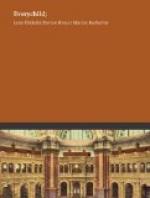But no, this could scarcely be. Every outline of the figure was too real. And besides, the person on the chest now moved slightly.
Everychild forced himself to advance a step, to move to right and to left, that he might learn something of that person who sat there in mysterious silence. And suddenly he found himself smiling and relaxing.
It was Will o’Dreams who sat there!
The giant had seen him at last, and he called out pleasantly, “You here too, Everychild? Come and sit down. There’s room for two here on this old chest.”
“I didn’t know you were here,” said Everychild.
“It’s the very sort of place I like to visit,” was the reply. “If ever you miss me, you’ve only to hunt for an old attic near by, and there you’ll find me.”
“I wonder why?” asked Everychild.
“Ah, I scarcely know. But a great many lovely persons come up into old attics—mostly children, or else quite old men or women—and I think they like to find me at such times.”
“And do you never frighten them?”
The giant laughed. “I’ve no doubt I do, sometimes. But mostly I am of real help to them. The old things that are left in attics seem somehow different if I’m about. Some day you’ll understand what I mean. And the sounds you hear in an attic, and the thoughts that come to you, seem pleasant in a way, as long as I’m near by.”
Everychild realized immediately that this was true; for at that very moment the owl in the dark tree outside the broken window hooted—and the sound was not at all what it had been only a little while ago.
“It’s fine to hear the owl make a noise like that, isn’t it?” he asked of the giant.
“Is it?” replied Will o’Dreams with a kindly taunt in his voice. “Suppose you tell me why.”
“I’m not sure I can. But you know it makes you think of so many wonderful and strange things.”
“Of what?” persisted the giant.
Everychild pondered a little, and then it seemed that he saw a sort of vision. “It makes you think of dark forests,” he said, “—the very middle of them. And it makes you think of old ruined castles, with nothing living about them any more but the ivy climbing up on the broken walls.”
The giant’s eyes were shining in the gloom. “And what else?” he asked softly.
“And then you think of the castles as they used to be, long ago. When there were bright lights in them, and knights and ladies, and music, and maybe a—what do you call them?—a harper to come in out of the storm to sit beside the fireplace and tell tales.” He seemed unable to fill in the picture more completely, but Will o’Dreams began where he had left off:
“And do you know what is true, as long as you think of the knights and ladies? It means that they are still living. That’s what thinking of things means—it means keeping them alive. Most persons die when their children are all dead: at the very latest, when their grandchildren die. But as long as you think of knights and ladies, and picture their ways, why, that keeps them alive. It means that they will never die. That is, as long as there are owls to hoot.” He added with a hidden smile, “And as long as I idle about in old attics.”




